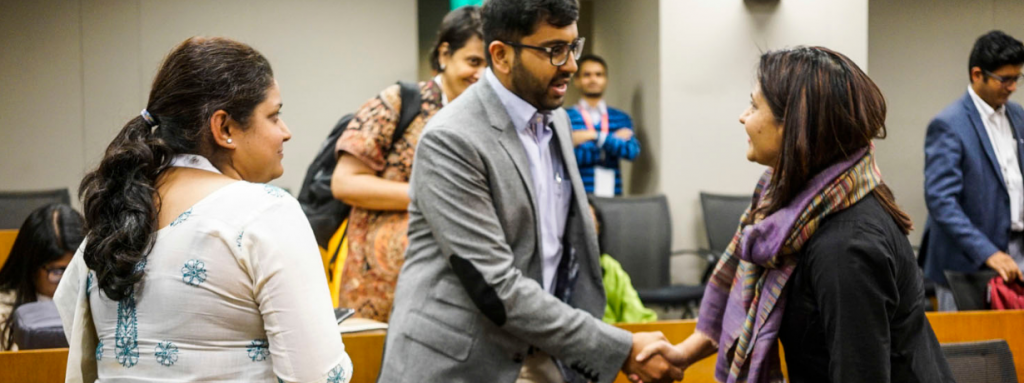Rai Mahimapat Ray (District Commissioner, Ranchi district) sharing a friendly moment with Prachi Windlass (Director, Michael & Susan Dell Foundation) and Pooja Kumari (Aspirational District Fellow, Ramgarh District)
Co-Author: Rachel Chan and Anjali Shivananda
5 min read
This article was written in collaboration with WINGS and published here as well”.
The United Nations estimates the financial capital needed to achieve the Sustainable Development Goals is US$ 5-7 trillion annually[1] – imagine if the reported amount could be deployed from the philanthropic capital worldwide towards achieving the SDGs. The complexity of the impact challenges in Asia have led to a call for more strategic collaborative opportunities between the philanthropic community and policymakers, so that greater impact can be created between their resources and policy mandates and programmes.
Prior to new forms of social investments like impact investments and impact bonds, the philanthropic community used to independently provide grants to tackle development issues. Despite best efforts over time, gaps persisted in funding and desired social impact, leading philanthropic organisations to not only venture into more innovative forms of capital mobilisation but also to invite creative forms of partnerships with policy actors to achieve development outcomes. On the other hand, policy actors grapple with the lack of human and financial capital to improve development outcomes, prompting the policy community to also explore new avenues beyond public funding to meet this need.
AVPN’s Asia Policy Forum (APF) was formed with a vision to create greater social impact by engaging policy and its stakeholders to catalyse the growth of socially impactful investments and related forms of capital. The role of government and policymakers can go far beyond laws and regulations, as explained in AVPN’s Social Economy Policy Framework. Collaborations between policymakers and philanthropy and social investment have the potential to channel financial, intellectual and human capital drawn from private and public sectors to build an enabling environment for the social economy to flourish. Since 2014, APF has engaged with over 300 policymakers and policy stakeholders in Asia to uncover the opportunities for collaboration with the philanthropic, social and impact investment community, resulting in flagship convenings in 2016, 2017 and 2018.
Recognising the importance of bringing APF’s regional efforts to local context and engagement, AVPN held its inaugural India Policy Forum (IPF), a curated convening on 5 December 2018 in New Delhi. The forum brought together policymakers and foundations, social purpose organisations and NGOs to catalyse private-policy joint efforts that bring development outcomes to aspirational districts and states in India.
Since 2014, between regional convenings and local engagement, AVPN has drawn insights around three ways that philanthropy and policy can collaborate for greater impact in Asia.
Philanthropic organisations have the flexibility to complement and supplement government initiated efforts
In AVPN’s policy convenings, several examples of interesting complementary support provided by philanthropy to enhance the work of the government was presented. In APF 2018, for example, we heard how the Social Outcome Fund, launched by Malaysia’s government, is engaging philanthropic actors with principle-only return if they fund initiatives that can address pressing social problems identified by the government. Toyota Foundation’s support of research to scale-up success factors of social innovation programmes around Asia that have been amplified by the respective governments, including the government of Japan.
These public-private collaborations may materialize at a more localised district level where a bottom-up level approach can be taken, as an alternative to waiting for initiation by the central or state government level. While most philanthropic organisations have theme-specific mandates, they have the flexibility to scope their geographical area of intervention to districts and villages, an added supplement to resource-scarce district administrations. For example, philanthropic organisations like Tata Trusts, Gates Foundation and Piramal Trust have partnered with the district administrations across India in the Aspirational Districts programme implemented by NITI Aayog, a government public policy think-tank, the programme aims to transform underdeveloped districts in India in collaboration with philanthropic organisations. These strategic philanthropists can bring performance management skills to identify the talent in policy stakeholders. If successful, the programme sets the necessary pre-conditions for foundations and non-profit organisations in India to act in greater coherence with the national and local government.
Regionally and locally, we uncovered the potential of philanthropy to help improve the inclination and know-how to drive evidence-based and impactful work among cross sector stakeholders, ultimately paving the way for more effective policy implementation in the long-run.
Make bold requests of each other for human, intellectual and financial capital support
Due to the lack of a common language, the potential for public-private partnerships are often not fully known – there are opportunities for policy and philanthropic sector to help each other in human capital (talent and manpower) and intellectual capital (know-how and tools), in addition to financial support. With a common platform like AVPN’s APF, we can now see recurring request for collaboration being raised by both the policy makers and social investors.
APF 2018 showcased some truly exciting innovations, like the implementation of blockchain-powered Smart Social Impact Bonds (SIB) by an AVPN member, Pan-Impact Korea, circumventing the limitations around existing impact investing tools while making the process more precise for all stakeholders involved. A counsellor from the Taiwan government also shared about its commitment to “open governance” and radical transparency in communication with its citizenry in order to catalyze social innovation, which is then further supported by the philanthropic community in Taiwan.
The India Policy Forum also fielded similar opportunities at various levels of government. The Deputy Commissioner of Ranchi district spoke on malnutrition in the state of Jharkhand. He articulated opportunities to collaborate in areas such as capacity building for field-level workers, financial support for upgrading infrastructure and technical assistance for data collection at the district level.
At the State level, a representative of the Delhi state government and Lend-A-Hand India, an NGO in Delhi, sought financial assistance in scaling their vocational education programme. They also sought to collaborate with organisations to replicate a similar partnership with other government partners.
From 2018’s discussions, it was clear that a commitment for cross-sector collaboration at different levels of governance encourages both private and policy sectors to make bold and strategic requests of each other for greater and more sustainable impact. This makes it possible for the government and foundations to tap into each other’s strengths and seek support in specific areas, with added benefit in which philanthropic organisations can provide tailored and wide-ranging financial and non-financial support across the Continuum of Capital.
The complex task of facilitating the roles of all stakeholders and conducting due diligence in the formation of partnerships can be driven by the philanthropic community
Foundations are playing a pertinent role in the social investing space by moving beyond simple programme funding with grants to explore more strategic uses of their philanthropic capital. Such examples were seeded from APF2018, like the partnership between the Inclusive Business Action Network (iBAN), funded by GIZ, the German development agency. iBAN is partnered with AVPN to engage the social investment and policy stakeholders to adopt inclusive business approaches in ASEAN.
At the India Policy Forum, we saw similar examples where philanthropy deploys strategically to catalyze more collaboration. Edelgive Foundation, as example, has a coalition network which includes the Government of Maharashtra, Kaivalya Education Foundation (KEF), and a group of funders to improve the learning levels of children in India. The foundation’s financial management background was an advantage for it to become an active facilitator between its partners, bringing the needed infrastructure, skill-sets and experience to coordinate among stakeholders to achieve a common goal.
Edelgive Foundation and iBAN’s examples highlight a collective responsibility among all stakeholders to actively form strong partnerships for enduring impact. Such cross-sector collaboration is more relevant today as governments may be data-rich but lack the skill and resource to deploy its assets for greatest impact; foundations also need to grow their capability to execute public-private partnerships effectively and sustainably. Through APF, AVPN is working towards enabling greater social impact by creating a platform for private and policy sector stakeholders to connect and build networks of constructive partnership, building capacity through learning and sharing best practices, and enabling impact by providing opportunities for collaborative action.
APFx – From Convening to Action
Through APF, AVPN has seen that a long-term relationship between policymakers and the philanthropic community, built on trust and aligned objectives, is necessary for silos to be broken and impact created. Long term commitments move policy interventions from pilot to scale and encourage the investment of patient capital (financial, human and intellectual) where both policy stakeholders and implementing organisations move with intent and precision in making systemic and sustainable impact. However, the challenge lies in creating and growing an ecosystem that catalyzes such strategic collaboration, so that the sentiments and insights shared to-date can propel policymakers and philanthropic actors from convening at APF or India Policy Forum, towards real opportunities for action.
To take our first step towards addressing this challenge, APF invites foundations, NGOs and the policy sector to list their public-private initiatives in APFx, a digital platform that enables financial, human and intellectual capital to support actionable public-private opportunities for impact. Many of the policy initiatives that AVPN has engaged with in 2018 are now listed on APFx.
AVPN’s mission is to mobilise financial, human and intellectual capital for impact – sustainable impact can only be achieved if such capital is strategically deployed. The imperative for philanthropy’s collaboration with policy is clear, and AVPN is excited to be at the growth of such commitment from its members and policy stakeholders in Asia. As 2019 kicks off, AVPN’s Asia Policy Forum and its related activities will bring more opportunities for philanthropy and policymakers to break boundaries and create more impact together.
[1] UNDP Blog. Impact Investment to Close SDG Funding Gap. 2017 Available at http://www.undp.org/content/undp/en/home/blog/2017/7/13/What-kind-of-blender-do-we-need-to-finance-the-SDGs-.html























